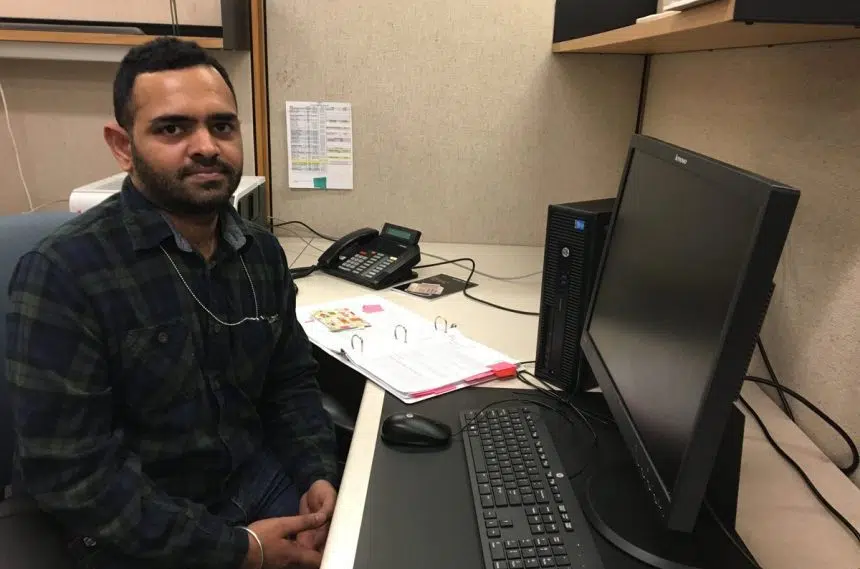Two years ago, Iqbal Singh Sharma suffered a brain injury when he was brutally stabbed while driving a cab in Regina, but now he is getting a new chance at life and work.
After coming to the brink of death and feeling hopeless, he fought his way back to rediscover the dream he had when he first came to Canada of finding a fulfilling career.
“It’s such a tremendous feeling and I am happy,” he said about the opportunity to work as a facilities technician at SaskTel.
Sharma has a master’s degree in mechanical engineering and worked as a professor in India before immigrating to Regina with his family just a few months before he was stabbed in the head, chest and neck in November 2016.
He was driving a cab for Co-op Taxi while waiting to have his degree evaluated to qualify as an engineer in Canada when he was attacked and left in a coma.
When his injury left him partially paralyzed and unable to speak, the father of two thought it was the end of his working life.
For a while, it was stuck in his mind that his brain injury would stop him from supporting his family. Sharma admits he struggled with depression and even had thoughts of suicide in the past two years.
Despite his limitations, he couldn’t stand the thought of not being able to work.
“I have a family to support, I don’t let them down,” he said, adding he also wants to set a good example to his kids.
Throughout his long rehabilitation and recovery, Sharma said he first had to focus and come to terms with his disabilities.
“I tried to digest that first. The second thing I learned how to speak because after I (got) injured my voice was completely gone,” Sharma explained slowly. “Step by step I learn how to speak.”
He said he had to relearn language the same way his children learned to speak.
The physical toll of his injury means he now needs to walk with a cane and greets people with a left handshake instead of his right.
While some people have brought him down, he has stuck to those who build him up with encouragement and support.
Sharma credits the workers at the Wascana Rehabilitation Centre and SaskAbilities Council Partners in Employment program for getting him to this point.
“Without their help, I don’t think I could recover,” Sharma said. “Recover mentally and recover physically to do some kind of positive work.”
‘Untapped market:’ SaskAbilities finds supportive working environments
Denine Peterson is a career planner for Partners in Employment, which is a division of SaskAbilities, and first met with Sharma in April.
She said in cases of acquired brain injury they start with a focus on proper supports for physical, emotional and mental rehabilitation.
“It really does take a toll on their emotional and mental well-being, going from working competitively to — as Iqbal mentioned — having to relearn how to do some essential key functions,” she said. “So making sure that not only employment supports are in place but overall mental health, emotional well-being is taken care of too.”
She said Sharma was a very unique case because they rarely see clients with acquired brain injuries who have such a high level of education to the point they’ve actually trained others in their field.
Peterson said all of that background and training was still there, but Sharma just had to work on polishing skills and understanding how to ask for accommodations in the workplace.
“There’s such great value, and overlooked value in hiring people with disabilities,” Peterson said.
“It’s an untapped market that maybe some employers haven’t considered and we can work with employers to help them design more inclusive hiring practices and learn how to support people with disabilities.”
Peterson said some employers assume they’re going to have to dedicate a lot of time and effort into supporting people with disabilities.
Sharma is one of 13 employees at SaskTel hired through the supportive employment program after the Crown partnered with the SaskAbilities council in 2012.
“Once you get to know the person and their strengths and skills then it’s so easy and it just happens naturally where they can be successful in their role,” Peterson said, noting the council appreciates every one of their employment partners.
She wants to encourage other people like Sharma who experience life-changing injuries to reach out to SaskAbilities for support if they face barriers to employment. But overall to not lose hope.
For Sharma, his message to other people in similar situations is also to not give up on the dream of finding meaningful work. He hopes his story will help create a new atmosphere and a new attitude toward careers.
“We cannot think that this is the end of work. In fact, it is a new beginning.”











